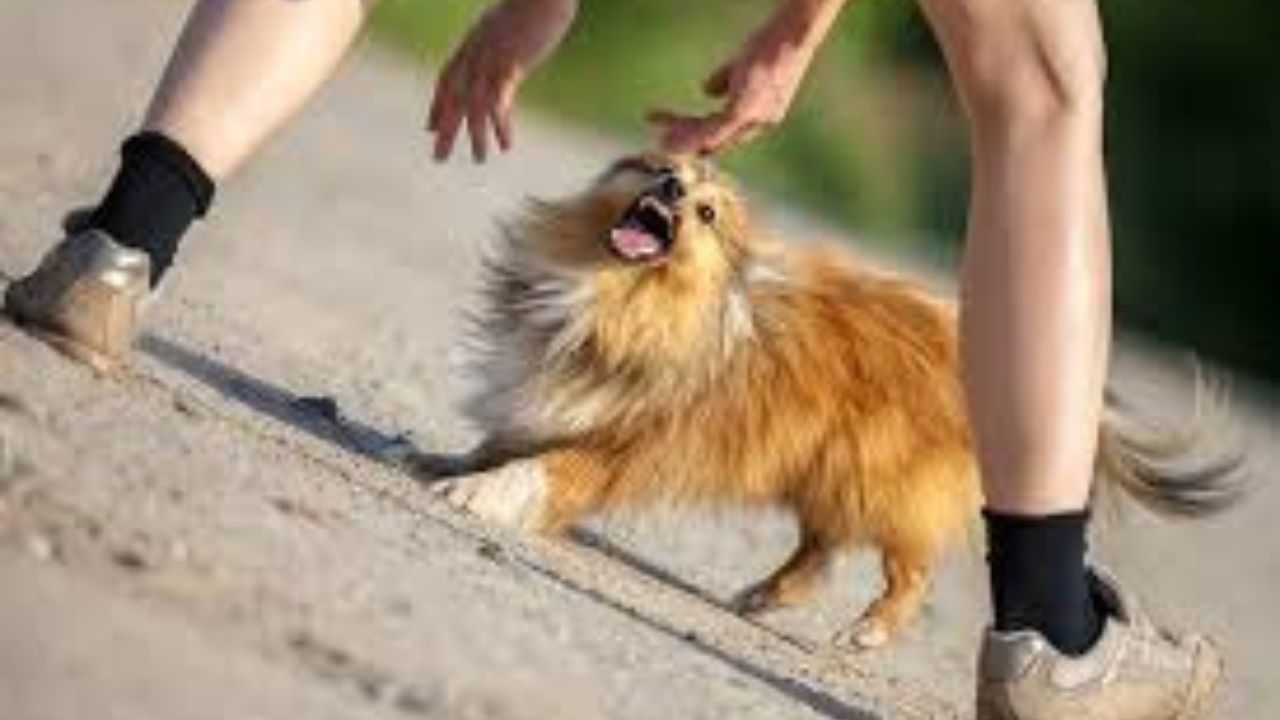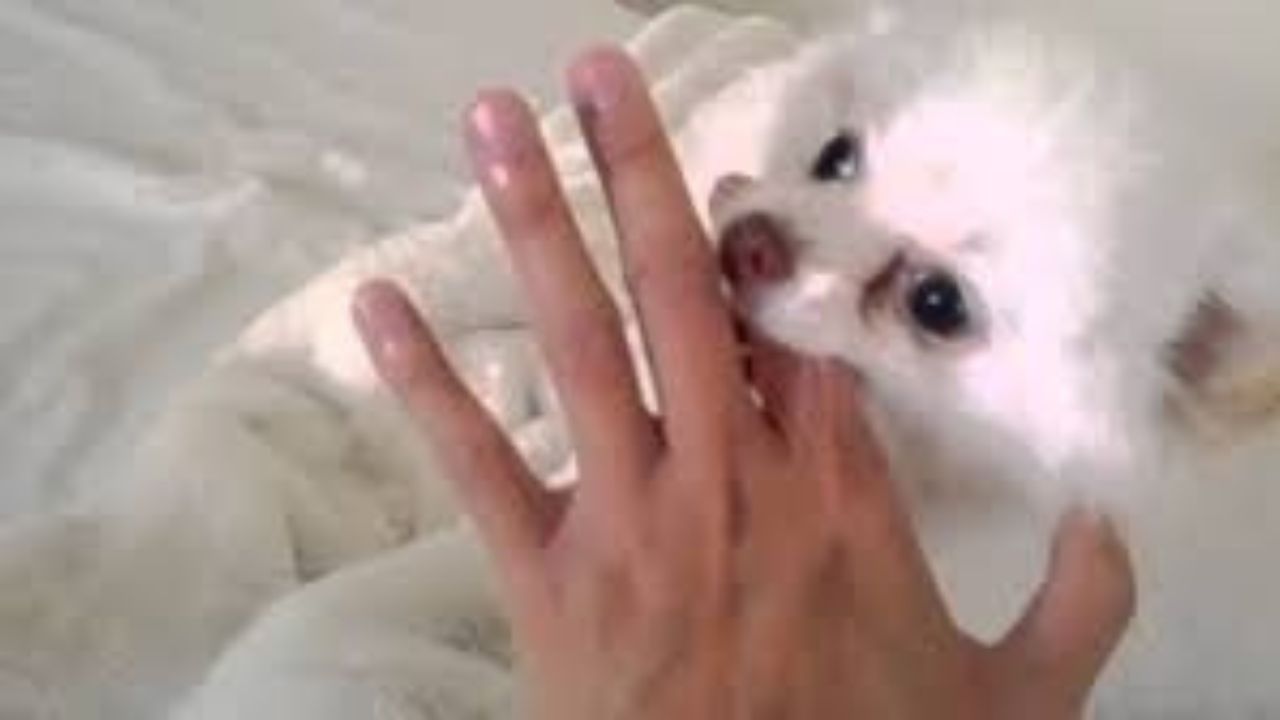Are Pomeranians aggressive, and do Pomeranians bite their owners? Pomeranians are not inherently aggressive dogs and do not typically bite their owners. However, like any dog, they can exhibit aggressive behaviour under certain circumstances.
Before delving into whether Pomeranians bite their owners, it’s crucial to understand the behavioural aspects, temperament, and factors influencing canine behaviour. Like any other breed, Pomeranians have unique traits, and various elements influence their propensity to bite.
Do Pomeranians Like Their Owners

Pomeranians typically form strong bonds with their owners, displaying affection and loyalty. These small, lively dogs often thrive on companionship and enjoy being close to their humans. Known for their cheerful demeanour, Pomeranians tend to exhibit devotion and love toward their owners, seeking attention and interaction.
Do The Pomeranians bite their owners Regular socialization and positive reinforcement can strengthen the bond, fostering a loving and affectionate relationship between Pomeranians and their owners.
The Pomeranian Behavior
Do The Pomeranians bite their owners Pomeranians are renowned for their lively disposition, affectionate nature, and compact size, making them popular household pets. However, like any dog breed, Pomeranians have behavioural inclinations that necessitate understanding and proper handling.
Nature and Temperament
These fluffy, small-sized canines are generally affectionate, energetic, and loyal. They often form strong bonds with their owners and thrive on attention and companionship. However, some Pomeranians may display behaviours like nipping or biting, which can stem from various factors.
Why Do Dogs Bite?
Dog Behavior, including biting, can be attributed to several reasons:
Territorial Instincts: Dogs, by nature, can be protective of their space and may display territorial behaviour, especially if they feel threatened or when strangers intrude.
Fear or Anxiety: Anxiety-inducing situations or fear can trigger defensive behaviour in dogs, leading to biting as a response to perceived threats.
Pain or Discomfort: Dogs might react aggressively if they’re in pain or discomfort, biting as a defensive mechanism to avoid exacerbating their condition.
Lack of Socialization: Insufficient exposure to various stimuli, environments, or other animals during their formative months might lead to behavioural issues like fear and aggression.
Communication: Sometimes, biting or nipping can be a means of communication for dogs to convey discomfort, playfulness, or even excitement.
Pomeranians and Biting Behavior
Do The Pomeranians bite their owners Pomeranians, despite their small size, may display biting tendencies. However, it’s important to note that this behaviour is not inherent to the breed but is often a result of various external influences and circumstances.
Socialization
Proper socialization from an early age plays a pivotal role in shaping a Pomeranian’s behaviour. Dogs that have been well-socialized tend to exhibit fewer behavioural issues, including biting. Early exposure to different people, animals, environments, and positive experiences can significantly reduce the likelihood of aggressive behaviour.
Training and Positive Reinforcement
Training is crucial in curbing biting tendencies in Pomeranians. Positive reinforcement techniques can be highly effective, such as rewarding good behaviour with treats or praise. Consistency in training and setting clear boundaries helps in teaching Pomeranians appropriate behaviour.
Environmental Factors
The environment in which a Pomeranian is raised can impact its behaviour. A nurturing, loving environment with ample mental and physical stimulation reduces stress and minimizes the likelihood of behavioural problems, including biting.
Dealing with Biting Behavior
Professional Guidance
Seeking advice from professional dog trainers or behaviourists can be immensely beneficial if a Pomeranian exhibits persistent biting behaviour. These experts can assess the situation, identify triggers, and suggest tailored strategies to effectively manage and modify the behaviour.
pomeranian aggressive biting
Summarizes concerning behaviour in Pomeranian dogs, indicating uncharacteristic aggression resulting in biting incidents. Despite their typically friendly demeanour, some Pomeranians may display aggressive behaviour, often due to fear, anxiety, or inadequate socialization.
Addressing this issue requires understanding triggers, implementing positive training techniques, socializing the dog, and seeking professional guidance. Timely intervention and patient training can help mitigate aggressive tendencies in Pomeranians, ensuring a safer and more harmonious interaction between the dog and its environment.
Pomeranian Dog Bite Treatment

Treatment for a Pomeranian dog bite involves immediate cleaning with soap and water to prevent infection. Apply an antiseptic and elevate the affected area to reduce swelling. Assess the wound’s severity and seek medical attention if necessary, especially for deep or puncture wounds. A doctor might recommend antibiotics to prevent infection and a tetanus shot if it’s been more than five years since your last one. Keep the wound clean, watch for signs of infection, and follow up with a healthcare professional for proper care.
The Triggers
Observing and understanding what triggers a pomeranian’s biting behaviour is crucial. Whether it’s specific situations, certain individuals, or particular actions that incite aggression, recognizing these triggers helps in proactive management and prevention.
Patience and Consistency
Addressing biting behaviour requires patience and consistency. It’s essential to remain calm and composed when dealing with such situations. Abrupt reactions or punishment can exacerbate the problem and worsen the dog’s behaviour.
Redirecting Behavior
Redirecting a Pomeranian’s attention or behaviour can be a valuable technique. Offering chew toys or engaging in alternative activities when the dog shows signs of nipping or biting helps redirect their focus.
Conclusion
In essence, while Pomeranians are generally affectionate and friendly companions, some may display biting tendencies, which are usually a result of various factors such as socialization, training, and environmental influences. Responsible ownership, proper training, socialization, and understanding the triggers for biting behaviour are fundamental in addressing and mitigating such tendencies in Pomeranians.
FAQ
Why Does My Pomeranian Keep Biting Me?
Your Pomeranian may be play-biting because they are getting wound up and frustrated. So make sure they have a secure place they can escape to. A bed or crate with three walls around it is ideal. This is particularly important if the dog is just a puppy and you have young children around who may pester them.
Do Pomeranians Turn on Their Owners?
The Pom, throughout generations, has always been a companion lap dog… Therefore, it is in the bloodlines to not be combative or have strong guarding instincts (although some can protect their humans despite their diminutive size).
Do Pomeranians Bite Strangers?
Because of their guarding instincts, Pomeranians can protect their family members and territory. If you do not socialize with them early on, they may become aggressive towards strangers they perceive as threatening their family.
Does Pomeranian Bite Hurt?
Since Poms have sharp little teeth, small nips can hurt quite a bit, and things can get out of control rather quickly. It is rare for this breed to bite due to an aggression problem. The foundation for biting often has its roots in a combination of play-nipping (typical puppy behaviour) and teething issues.

